Wednesday, 30th–We were routed from our beds of leaves at 4 o’clock and moved on two miles farther in the direction of Purdy, when we received word from General Wallace that we were not needed. We marched back to camp, arriving here about noon, in a heavy rainstorm, soaked to the skin and covered with mud. We had lain all night with rifle in hand, in a heavy timber, on beds of leaves, without blankets, and some of the boys caught cold. The Eleventh Iowa was inspected today for pay. Thus ends this month in old Tennessee.
American Civil War Chronicles
0
April 30, 2022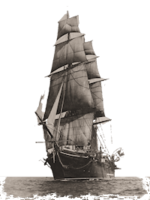
April 30th. At 2 P. M., a steamer came up and landed the prisoners from the forts. This day, between the hours of ten and twelve o’clock, the carpenter of the fleet held a survey on this ship, and reported her not seaworthy, on account of a shot under her starboard counter.
War Diary of Luman Harris Tenney.
April 30, 2022
30th. Received letters from Fannie and Uncle Albert. Answered Fannie’s. Beautiful day. Arrested a suspicious looking fellow, acted like a spy. Told of the fight at Neosho and the Indian band on Cowskin Prairie.
A Diary From Dixie
April 30, 2022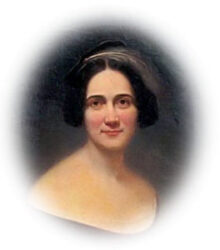
April 30th.–The last day of this month of calamities. Lovell left the women and children to be shelled, and took the army to a safe place. I do not understand why we do not send the women and children to the safe place and let the army stay where the fighting is to be. Armies are to save, not to be saved. At least, to be saved is not their raison d’être exactly. If this goes on the spirit of our people will be broken. One ray of comfort comes from Henry Marshall. “Our Army of the Peninsula is fine; so good I do not think McClellan will venture to attack it.” So mote it be.
“We have met the enemy and we are theirs!”
April 30, 2022
April 30.
. . . We had a very pleasant visit the other night from Charles Johnson, of Norwich, just returned from Port Royal. He went down as Allotment Commissioner from Connecticut and had pretty good success. He was particularly indignant about the chaplain of the Connecticut __th who had made a “handsome thing” all along out of the men whose money he received for being forwarded to their homes. He charged them a commission, and then by buying drafts on New York, which are at a premium in Bridgeport, Conn., managed to make his one per cent net. Charles J. arrived out the day of the bombardment of Fort Pulaski and was among the first visitors after its surrender. It was curious, he said, to see the extra defenses prepared by the rebels; heavy timber blindages against the casemates and quarters, all round the fort inside, sodded six feet deep with earth dug from trenches with which the whole parade was crisscrossed. These ditches were already two feet deep with the green, slimy water which had oozed upward through the soil. . . . He said that the 7th Connecticut, now garrisoning the fort, were a pale, peaked, sick-looking set, but every man of them as proud as Lucifer, and he came home with a higher idea than ever of the energy and spirit of our troops. One night he and Colonel Terry and Dr. Bacon couldn’t sleep on account of the mosquitoes and heat, and they agreed to bring out the letters left behind by the rebel prisoners, which had to be examined and sent some day to Savannah by flag of truce. There were more than a hundred; some very laughable specimens of course, but some well written and sensible. About thirty were written in one hand, by some officer for his different privates I suppose, and every one of them began, “We have met the enemy and we are theirs!” always winding up with the earnest advice to their friends, to quit Savannah. . . . Mr. Prentiss has lately spent a week in Washington, in company with Dr. Stearns and Professor Schaff. Everywhere they went, of every great man, Professor Schaff asked his stock question–whether the social and political conquest of the South was not to be more difficult than its military conquest. He received very characteristic answers. President Lincoln thought “perhaps, yes–but it wouldn’t cost so much money! “ Mr. Seward said, decidedly, “No” and then trotted himself out, most obligingly, in a dainty little sort of oration, using one of his fine figures in illustration. “You are like President King,” he said, “who was greatly concerned here, last week, about the dome of the Capitol, how it was ever to be finished, and whether it would bear the weight of the figure of Liberty that is to be placed on it, and how the figure was to be got up there, etc. I don’t know how it is to be done, but the engineers know. The plans were all made to accomplish just that result. The dome was built for the figure, and this figure cast to be in harmony and size with it, and the pulleys and ropes are all agreed upon; and though it is a long way from the ground, where the statue lies now, to the top of the finished dome, I know that the work will be done, and the figure of Liberty shall yet stand on the top of the Capitol.” . . . Mr. Chase was not so eloquent or philosophic. He thought we ought to “do our present duty and leave the future to Providence,” which perhaps was the best answer of all; and putting the three together Professor Schaff was well satisfied with the argument and quite willing to be laughed at by his friends for his pertinacity in asking the question.
Hospital Ship Daniel Webster at York River.
April 30, 2022 From Eliza’s Journal.
From Eliza’s Journal.
S. S. Daniel Webster.
Just before sunset, last night, we passed the mouth of the York River, and could see our gunboats and a fleet of some four hundred sloops and schooners lying a little way up it–among them our fleet, Franklin’s Division, still lying off Ship Point. We made our way in among them and dropped anchor just off the Point within a stone’s throw of the rebel barracks, now used as a hospital for our men. After dark we could see the lights of the fleet all around us like the lamps of a great city on the shores of a harbor, and these, with the camp-fires on shore lighting up the horizon, and the little row-boats darting about, dashing up phosphorescence at every stroke of the oar, made the scene a magical one; while the bugle calls and regimental bands on the different boats increased the effect. Joe’s boat, the Daniel Webster No. 2, lies further away from us up towards Cheese-man’s Creek. . . .
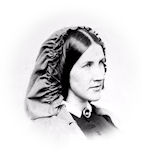 Georgeanna’s Journal.
Georgeanna’s Journal.
Next morning Mr. Olmsted hailed the steamer which carried the 16th New York, to “let the Colonel know that his wife was on board among the nurses.” He received an acknowledgment from the Colonel in the form of a check for one thousand dollars for the Sanitary Commission, and what was still better, Mr. O. said, a note of hearty appreciation of the Commission’s work for the soldiers. Joe soon came over to the steamer himself, and Lenox Hodge, who was with a Philadelphia detail of surgeons on the steamer Commodore, also came on board.
Floating Hospital.
April 30, 2022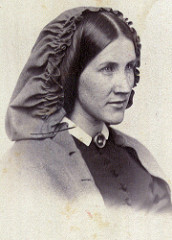
Floating Hospital, Daniel Webster.
Cheeseman’s Creek, April 30, ‘61.
The sail down the Potomac to Acquia Creek, where we anchored for the night, was extremely pretty. Just as we started the little gunboat “Yankee” passed up, bringing, all on a string, five rebel craft she had just taken in the Rappahannock.
Late in the afternoon we passed the stone fleet, eight boats all ready to sink in the channel, in case the Merrimac should try to run up the Potomac. The rebels having taken up all the buoys, we had to come to anchor at dark. Sunday, the first day, was gone. As for us, we had spent it sitting on deck, sewing upon a Hospital flag fifteen by eight, and singing hymns to take the edge off this secular occupation. It is to be run up at once in case we encounter the Merrimac. Just as we anchored, a chaplain was discovered among the fifty or sixty soldiers on board–men returning to their regiments, and in half an hour we got together for service and an unprepared discourse exhorting the Sanitary Commission to works of charity! The contrabands all came in and stood in a row, so black, at the dark end of the cabin, that I could see nothing but eyes and teeth; but they sang heartily and everybody followed them.
Journal of Surgeon Alfred L. Castleman.
April 30, 2022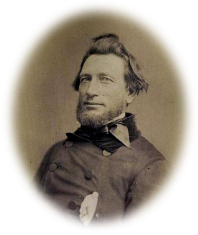
30th.–Still quiet to-day, with exception of an occasional report of artillery along the line, and some picket firing. A. B. Millard, Co. G, 5th Wisconsin, brought in to-day, badly wounded in the shoulder. He lived about four hours after being shot. He is the first man killed from that regiment, though it has been eight months in the field. Am not well to-day. Have diarrhÅ“a, and threat of fever.
General Washington’s rifle pits extend for miles in front of our camps. The state of perfection in which they now are, after the lapse of eighty years, is surprising. A road runs by the side of the ditches, and were it not for the immense pine trees growing on the embankments, they would be taken for modern works to drain the road. These rifle pits surrounded Cornwallis at Yorktown, and from them was fought the closing battle of the revolution. May they serve the same good purpose for us now!
The Fight for Food and Clothing
April 30, 2022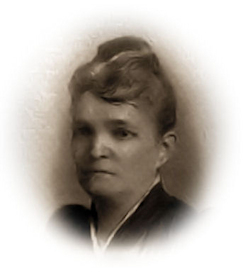
April 30.—The last two weeks have glided quietly away without incident except the arrival of new neighbors—Dr. Y., his wife, two children, and servants. That a professional man prospering in Vicksburg should come now to settle in this retired place looks queer. Max said:
“H., that man has come here to hide from the conscript officers. He has brought no end of provisions, and is here for the war. He has chosen well, for this county is so cleaned of men it won’t pay to send the conscript officers here.”
Our stores are diminishing and cannot be replenished from without; ingenuity and labor must evoke them. We have a fine garden in growth, plenty of chickens, and hives of bees to furnish honey in lieu of sugar. A good deal of salt meat has been stored in the smoke-house, and, with fish in the lake, we expect to keep the wolf from the door. The season for game is about over, but an occasional squirrel or duck comes to the larder, though the question of ammunition has to be considered. What we have may be all we can have, if the war last five years longer; and they say they are prepared to hold out till the crack of doom. Food, however, is not the only want. I never realized before the varied needs of civilization. Every day something is “out.” Last week but two bars of soap remained, so we began to save bones and ashes. Annie said: “Now, if we only had some china-berry trees here we shouldn’t need any other grease. They are making splendid soap at Vicksburg with china-balls. They just put the berries into the lye and it eats them right up and makes a fine soap.” I did long for some china-berries to make this experiment. H. had laid in what seemed a good supply of kerosene, but it is nearly gone, and we are down to two candles kept for an emergency. Annie brought a receipt from Natchez for making candles of rosin and wax, and with great forethought brought also the wick and rosin. So yesterday we tried making candles. “We had no molds, but Annie said the latest style in Natchez was to make a waxen rope by dipping, then wrap it round a corn-cob. But H. cut smooth blocks of wood about four inches square, into which he set a polished cylinder about four inches high. The waxen ropes were coiled round the cylinder like a serpent, with the head raised about two inches; as the light burned down to the cylinder, more of the rope was unwound. To-day the vinegar was found to be all gone and we have started to make some. For tyros we succeed pretty well.”
Note: To protect Mrs. Miller’s job as a teacher in post-civil war New Orleans, her diary was published anonymously, edited by G. W. Cable, names were changed and initials were generally used instead of full names—and even the initials differed from the real person’s initials. (Read Dora Richards Miller’s biographical sketch.)
Rebel War Clerk
April 29, 2022
APRIL 29th.—Major Griswold is here, and so is a new batch of Marylanders.
Downing’s Civil War Diary.–Alexander G. Downing.
April 29, 2022
Tuesday, 29th–We received orders this afternoon to march out towards Purdy, about twelve miles, to be in readiness as a supporting column to General Wallace in command of the right. He was expecting to be attacked by the rebels and sent for reinforcements. We went in light marching order without knapsacks, and we have to lie on our arms at night.
0
April 29, 2022
April 29th. We have been lying quietly at our anchorage here for two or three days, negotiating about the city and its flag and transfer. The river is alive with steamers which our people have taken possession of, and are gliding about seemingly practicing for duty by-and-by; among others, a fine steamer, the Tennessee, has been taken possession of and will doubtless prove quite a prize for us. The rebel gunboat McRae came up from the forts with a flag of truce, asking permission to bury her dead, but instead, watched her chance and scuttled her in deep water.
This morning a gunboat from the forts brought the pleasing intelligence that Forts Jackson and St. Philip had both surrendered to our forces below, and that a powerful floating battery, mounting eighteen guns and covered with railroad iron, had been fired and drifted down the river and blown up. This intelligence called all hands into the rigging, and they gave three times three cheers for the Union. At nine o’clock A. M., the marines of the squadron, under the command of Capt. J. L. Broome, went ashore to hoist the flag, backed by the howitzers; they proceeded to the Custom House and gave the Star-Spangled Banner to the breeze; thence they went to the Council House and lowered the State flag and brought it aboard as a trophy. Crowds of people frequent the levee to gaze on the shipping from day to day.
At 6:30 A. M., Capt. Bailey brought word up from below, that both forts had surrendered, and the Stars and Stripes were waving over them. At 3 P. M., Mr. Osbon, Flag Lieutenant, left the ship to go on board the gunboat Cayuga; as he was leaving, gave him three cheers. Cayuga, Capt. Bailey in command, went down the river, bound North with dispatches. Manned the rigging, and cheered ship.
War Diary of Luman Harris Tenney.
April 29, 2022
29th. Baggage train and remainder of companies came in. Letter from Lucy Randall and several papers–rich treat. Wrote to Will Hudson.
A Diary From Dixie
April 29, 2022
April 29th.–A grand smash, the news from New Orleans fatal to us. Met Mr. Weston. He wanted to know where he could find a place of safety for two hundred negroes. I looked into his face to see if he were in earnest; then to see if he were sane. There was a certain set of two hundred negroes that had grown to be a nuisance. Apparently all the white men of the family had felt bound to stay at home to take care of them. There are people who still believe negroes property–like Noah’s neighbors, who insisted that the Deluge would only be a little shower after all.
These negroes, however, were Plowden Weston’s, a totally different part of speech. He gave field-rifles to one company and forty thousand dollars to another. He is away with our army at Corinth. So I said: “You may rely upon Mr. Chesnut, who will assist you to his uttermost in finding a home for these people. Nothing belonging to that patriotic gentleman shall come to grief if we have to take charge of them on our own place.” Mr. Chesnut did get a place for them, as I said he would.
Had to go to the Governor’s or they would think we had hoisted the black flag. Heard there we are going to be beaten as Cortez beat the Mexicans–by superior arms. Mexican bows and arrows made a poor showing in the face of Spanish accoutrements. Our enemies have such superior weapons of war, we hardly any but what we capture from them in the fray. The Saxons and the Normans were in the same plight.
War seems a game of chess, but we have an unequal number of pawns to begin with. We have knights, kings, queens, bishops, and castles enough. But our skilful generals, whenever they can not arrange the board to suit them exactly, burn up everything and march away. We want them to save the country. They seem to think their whole duty is to destroy ships and save the army.
Mr. Robert Barnwell wrote that he had to hang his head for South Carolina. We had not furnished our quota of the new levy, five thousand men. To-day Colonel Chesnut published his statement to show that we have sent thirteen thousand, instead of the mere number required of us; so Mr. Barnwell can hold up his head again.
Journal of Surgeon Alfred L. Castleman.
April 29, 2022
29th.–A quiet day. Men seem cheerful and happy, but sickness increases. No medicines nor hospital stores, except those furnished by Sanitary Commission. I must take the liberty of thinking our Medical Director deficient in–something. What should we do now without the Sanitary Commission?
Downing’s Civil War Diary.–Alexander G. Downing.
April 28, 2022
Monday, 28th–We had company drill at 9 a. m. The weather is getting very warm; the sun shines hot, and we are sweeping our camp with brush brooms. We are being kept quite active, the doctors, we hear, having told the officers that the men would have better health if kept at work.
War Diary of Luman Harris Tenney.
April 28, 2022
28th. People began to come into town for their property. Six prisoners were released. Somebody shot at them. I am tired of this barbarous way of soldiering. Doubleday returned to Fort Scott with body guard.
Rebel War Clerk
April 28, 2022
APRIL 28th.—We have rumors of an important cabinet meeting, wherein it was resolved to advise or command Gen. Johnston to evacuate Yorktown and retire toward Richmond! Also that Norfolk is to be given up! I don’t believe it; Lee’s name is not mentioned.
“Nurses at large” on the “Daniel Webster No. 1.”
April 28, 2022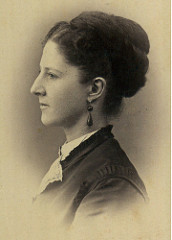
Monday Morning, April 28.
Where do you think I am? On the “Daniel Webster No. 1,” which the Sanitary Commission has taken as a hospital ship. We are now on the way down to Cheeseman’s Creek, near Ship Point, and when you receive this we shall be lying just there. Saturday afternoon the gentlemen of the Commission, Mr. Olmsted and Mr. Knapp, came over to see us, and to our great surprise and pleasure proposed to us to come down with them in the ship as “nurses at large,” or matrons, or what not–to do of course all we can for the sick and wounded men in the approaching battle. They had telegraphed to Mrs. William P. Griffin and Mrs. Lane of New York to come on at once, and go too. We only had one night’s notice, as they were to leave early Sunday morning, but we accepted the offer at once, and here we are! We four are the only women on board except a colored chambermaid, but there are 30 or 40 men nurses and hospital dressers, and several members of the Commission–Mr. Olmsted, Mr. Knapp, Mr. Lewis Rutherford, Mr. Strong, Dr. Agnew, Dr. Grymes, etc. They have two boats, this and the Elm City. The latter is to be a receiving ship and permanent floating hospital, and this one the transporting one, in which the wounded will be carried at once by sea to New York, Philadelphia, or Baltimore and Washington, as the case may be. It is an old ocean steamship, and used to run on the Aspinwall route; is stanch and seaworthy, but now wretchedly dirty. A dozen stout contrabands are at work night and day scrubbing and cleaning, and, as they finish, the whitewashers and carpenters succeed them, and by degrees it will be put in good condition. . . . I saw Mrs. Franklin the night before we started and have a note for the General. We left our little dog Mopsey with her. . . . If you are still off Ship Point we shall be very near each other. . . . There is a P. O. station at Cheeseman’s Creek to which please direct your letters to me, care of Fred. Law Olmsted, Hospital Ship of Sanitary Commission.
You will work yourselves sick.
April 28, 2022
New York, April 28.
My dear Sisters: Mother’s letter of Sunday morning, giving the startling intelligence of your having gone off suddenly to Fort Monroe, came before breakfast. Since it was your very earnest wish, and, as Mr. Prentiss tells us, you might have chafed at being held back–why I am glad you have gone. But it seems to me a very trying position for you: you will work yourselves sick. Joe will be the most surprised person, and I don’t believe he will approve of your being on a hospital boat. It is very satisfactory that Mrs. Griffin is on board; as long as she stays you will not need either man or woman protector. . . . Georgy’s letter to Charley came with Mother’s. He will see to the wire camp-beds, and we will put the other stores, your hats, etc., etc., all in a trunk and have them ready for the first opportunity. If you write for Charley he will take them on at once. . . . It is strange that Mr. Olmsted should have had you in mind, without having known of your desire to go. It shows that, as Georgy says, “Heaven had opened the door.” . . . Our best love to you two dear brave girls; you are doing what you love to do, and I hope will take care of yourselves as well as of the soldiers.
Journal of Surgeon Alfred L. Castleman.
April 28, 2022
28th.–Marched out this morning, to support our pioneers, who are cutting out a brushy ravine, which has afforded cover to the enemy’s pickets, from which to inflict much damage to ours. We met with resistance, and have had quite a brush of a fight over it, but succeeded in driving the enemy out. Here, again, I am astonished at our men’s indifference to danger, and their apparent insensibility to the suffering of their comrades. During the fight, our whole regiment were lying on the ground, laughing, talking, whittling and cracking jokes, as unconcernedly as if they were preparing for a frolic; and, yet we were constantly receiving intelligence of comrades falling within a few rods of us. So near were we to the fight that we could occasionally hear the rebels calling to the “damn-d Yankees to come on.” Sometimes when a wounded or dead soldier was brought by on a litter, the soldiers would discuss the question whether they would rather be litter-bearers or litter-borne, and would even get one of their number on a litter, with litter-bearers, and “play wounded.” Such is the demoralization of war, and it is one of the least of its evils. War may be necessary, but–
“Och! it hardens a’ within,
An’ petrifies the feeling.”
Plans to return to New Orleans dashed.
April 28, 2022
April 28, 1862.—This evening has been very lovely, but full of a sad disappointment. H. invited me to drive. As we turned homeward he said:
“Well, my arrangements are completed. You can begin to pack your trunks to-morrow, and I shall have a talk with Max.”
Mr. R. and Annie were sitting on the gallery as I ran up the steps.
“Heard the news?” they cried.
“No! What news?”
“New Orleans is taken! All the boats have been run up the river to save them. No more mails.”
How little they knew what plans of ours this dashed away. But our disappointment is truly an infinitesimal drop in the great waves of triumph and despair surging to-night in thousands of hearts.
Note: To protect Mrs. Miller’s job as a teacher in post-civil war New Orleans, her diary was published anonymously, edited by G. W. Cable, names were changed and initials were generally used instead of full names—and even the initials differed from the real person’s initials. (Read Dora Richards Miller’s biographical sketch.)
“Oh, it is so hard to see the enemy making such inroads into the heart of our country!”—Diary of a Southern Refugee, Judith White McGuire.
April 27, 2022
27th.–The country is shrouded in gloom because of the fall of New Orleans! It was abandoned by General Lovell—necessarily, it is thought. Such an immense force was sent against the forts which protected it, that they could not be defended. The steamer Mississippi, which was nearly finished, had to be burnt. We hoped so much from its protection to the Mississippi River. Oh, it is so hard to see the enemy making such inroads into the heart of our country! it makes the chicken-hearted men and women despondent, but to the true and brave it gives a fresh stimulus for exertion. I met two young Kentuckians to-night who have come out from their homes, leaving family and fortunes behind, to help the South. After many difficulties, running the blockade across the Potomac, they reached Richmond yesterday, just as the news of the fall of New Orleans had overwhelmed the city. They are dreadfully disappointed by the tone of the persons they have met. They came burning with enthusiasm; and anything like depression is a shock to their excited feelings. One said to me that he thought he should return at once, as he had “left every thing which made home desirable to help Virginia, and found her ready to give up.” All the blood in my system boiled in an instant. “Where, sir,” said I, ” have you seen Virginians ready to give up their cause?” “Why,” he replied, “I have been lounging about the Exchange all day, and have heard the sentiments of the people.” “Lounging about the Exchange! And do you suppose that Virginians worthy of the name are now seen lounging about the Exchange? There you see the idlers and shirkers of the whole Southern army. No true man under forty-five is to be found there. Virginia, sir, is in the camp. Go there, and find the true men of the South. There they have been for one year, bearing the hardships, and offering their lives, and losing life and limb for the South; it is mournful to say how many! There you will find the chivalry of the South; and if Virginia does not receive you with the shout of enthusiasm which you anticipated, it is because the fire burns steadily and deeply; the surface blaze has long ago passed away. I honour you, and the many noble young Kentuckians who have left their homes for the sake of our country, but it will not do for Kentucky to curl the lip of scorn at Virginia. Virginia blushes, and silently mourns over her recreant daughter, and rejoices over every son of hers who has the disinterestedness to leave her and come to us in this hour of our bitter trial.”
I do not believe that this young man really means, or wishes, to return; he only feels disheartened by the gloom caused by our great national loss.
Rebel War Clerk
April 27, 2022
APRIL 27th.—Gen. Lee is calm—but the work of preparation goes on night and day.
Downing’s Civil War Diary.–Alexander G. Downing.
April 27, 2022
Sunday, 27th–Today we had company inspection. We had to go to work and clean up our camp and parade ground. The camp is in the timber. The water is very scarce and poor at that.